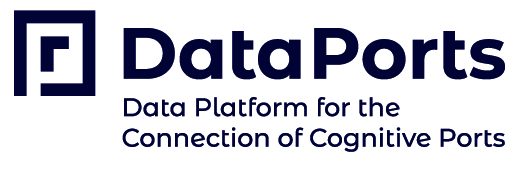


Description of the project and main expected results
DataPorts is a project funded by the European Commission as part of the H2020 Big Data Value PPP programme, and coordinated by the Technological Institute of Informatics (ITI). DataPorts rely on the participation of 13 partners from five different nationalities. The project involves the design and implementation of a data platform, its deployment in two relevant European seaports connecting to their existing digital infrastructures and addressing specific local constraints. Furthermore, a global use case involving these two ports and other actors and targeting inter-port objectives, and all the actions to foster the adoption of the platform at European level.
Hundreds of different European seaports collaborate with each other, exchanging different digital data from several data sources. However, to achieve efficient collaboration and benefit from AI-based technology, a new integrating environment is needed. To this end, DataPorts project is designing and implementing an Industrial Data Platform.
DataPorts focusses on a key transport domain in the global supply chain: seaports, and on making it significantly easier, faster and more trustworthy to deliver big data solutions by integrating data assets from a variety of stakeholders.
The main ambition of DataPorts is to create a trusted and secure environment where all actors operating in the diverse supply chains involved in European seaports could share and trade their data. This will boost the transition from digital / connected to smart / cognitive ports, involving the setting-up of new services, an increase of the efficiency of the ports, and a reduction of the environmental impact.
DataPorts aims to take advantage of the huge amount of data generated around modern connected seaports, and the high level of digitalization that these ports have achieved, leveraging on the existing digital platforms and tools, to establish an industrial data platform where data coming from different stakeholders and external sources can be combined and processed and get real value from them in order to improve existing processes, establish novel cognitive and AI-based applications, and allow new business models.
This is done by focusing on the following:
DataPorts will allow establish a future Data Space unique for all maritime ports of Europe and contribute to the EC global objective of creating a Common European Data Space.
List and short description of relevant pilots/living labs or test beds.
The real-life deployment, testing and evaluation of the DataPorts platform takes place in two local demonstration sites, the ports of Valencia and Thessaloniki. The platform will be deployed and connected to the existing digital infrastructures of each port, given access to the different data sources and operated by relevant stakeholders, to whom the data platform will offer data driven services to address concrete problems.
The Valencia pilot defines four different scenarios that can be deployed during the pilot execution phase to demonstrate how DataPorts could be used by several port organizations. The first scenario focus on monitoring and tracking (container and goods tracking and transport operations) in order to increase the knowledge about a transport operation. The second scenario uses data aggregation and advanced analytics (port authority data sharing) for providing cognitive services, i.e., predictive services for a specific KPI for port stakeholders. And finally, this pilot develops two scenarios to create a trusted environment for sharing port documentation and weight verification.
The Port of Thessaloniki is going to make use of the Blockchain feature of the DataPorts platform, to implement two use cases that showcase secure information sharing between the Port and related parties (shipping agents and trucking companies), involving the business cycle of the electronic request to pick-up a container. DataPorts’ features of big data analytics are going to be utilised in use cases involving a) the production of statistics and queues predictions based on operational data and b) the merging of data coming from multiple sources including open (public) data and mobility data, to produce analytics and predictions related to activity in the port area.
In addition, there are two global Use Cases. The first one consist in the integration of Smart Containers data in the DataPorts platform. A Smart Container is a marine shipping container, which is fitted with an installed smart monitoring device. This use case is focused on equip the assets to get an end to end visibility solution for cargo owners to track shipments position, temperature and condition in real-time. The smart container physical reliable data will be key enabler to enhance supply chain performance with data-driven decisions. In addition, this will help prevent shipments disruption with configurable alerts and notifications.
The second one is focused on the integration of a Port Management System with the DataPorts platform. The chosen one is the Posidonia Port Solutions software, owned by a partner of the project called Prodevelop, that is a suite whose modules can be deployed separately or together and cover the vast majority of a Port Authority’s management processes.